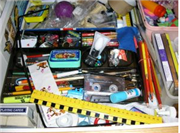 Habit #4: being disorganized = creative
Habit #4: being disorganized = creative
Messy, discombobulated spaces people sound as if they’re making up a lame excuse by stating how disorder fosters creativity. Disarray they claim as their muse.
My husband Larry and I don’t make excuses. We are avowed ‘piles people’, fortunate that our home has plenty of square footage to sustain our creativity as well as ample space to entertain friends. I’ve begun sorting my stash of 2014 receipts for tax prep – we won’t be eating at the dining room table for awhile…
Scientific research backs up the order of disorder. Chaos does indeed encourage people to think outside the box and come up with novel solutions. Volunteers in a study at Northwestern University were faster at solving puzzles when they were in a messy room as opposed to a tidy one. They also drew more creative pictures in a messier setting.
Since disorder has such a powerful effect on the mind, you may want to save your mess for the right context. Keep your accounts tidy and orderly, but allow clutter in spaces where you need more creativity.
Guess what my writing space looks like, as opposed to my clothes closet and drawers, for example.
Habit #5: wasting time
What could be a bigger waste of time than trawling the internet for crazy cuddly animal pictures or videos of people doing daffy things? Plenty of things, surprisingly. Studies have shown that, as counter-productive as it seems, this common habit can actually help your brain to focus and complete tasks accurately. Researchers at Hiroshima University found that viewing images of cute baby animals triggered care-giving instincts, so that people devoted more concerted effort on subsequent tasks.
Now that you can guiltlessly surf the web for cute animal images, bear in mind that it’s even better if you can find a video of a puppy or kitten doing something hilarious. The motion raises more emotion. Laughter reduces blood pressure, relieves pain and makes the body more resilient to stress.
Nibbling on your nails is considered bad because of social convention – plus, it’s bad for your teeth. However, before we had nail clippers – and, most certainly before sharp knives were forged – humans would likely have bitten their nails for two reasons:
- it keeps them from getting too sharp and from injuring us
- it exposes the immune system to bugs. Research consistently shows that small exposures to bugs will help boost immunity.
If you’re not a nail-biter, rest assured, you don’t have to start. Follow the principle that small amounts of exposure to bacteria are health-boosting, though not the massive amounts that accumulate by shaking hands and hugging people during flue-cold season. So wash your hands as often as you like – especially if/when you’ll be around me, Constant Reader.
And do attend to your computer station and phone…
I remain proud that I broke the nail-biting habit twenty years ago. I feel more adult, valued by myself, less open to public disdain.
Now, to sterilize my computer keyboard without harming the innards…I once destroyed the ‘K’ key, so that nothing was ‘OK’.


Recent Comments